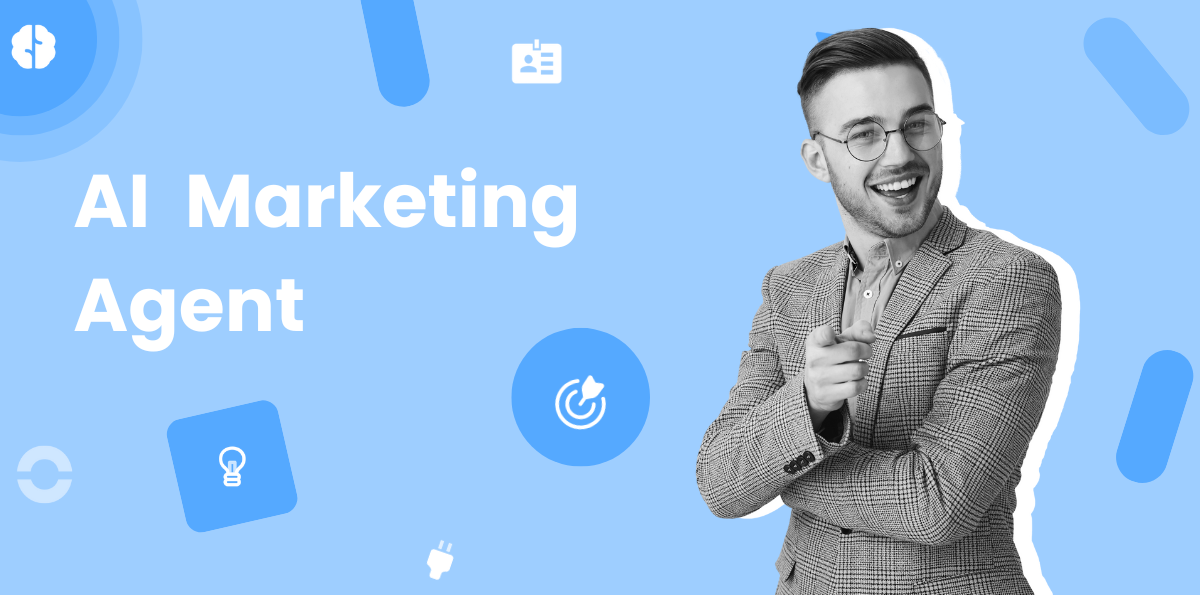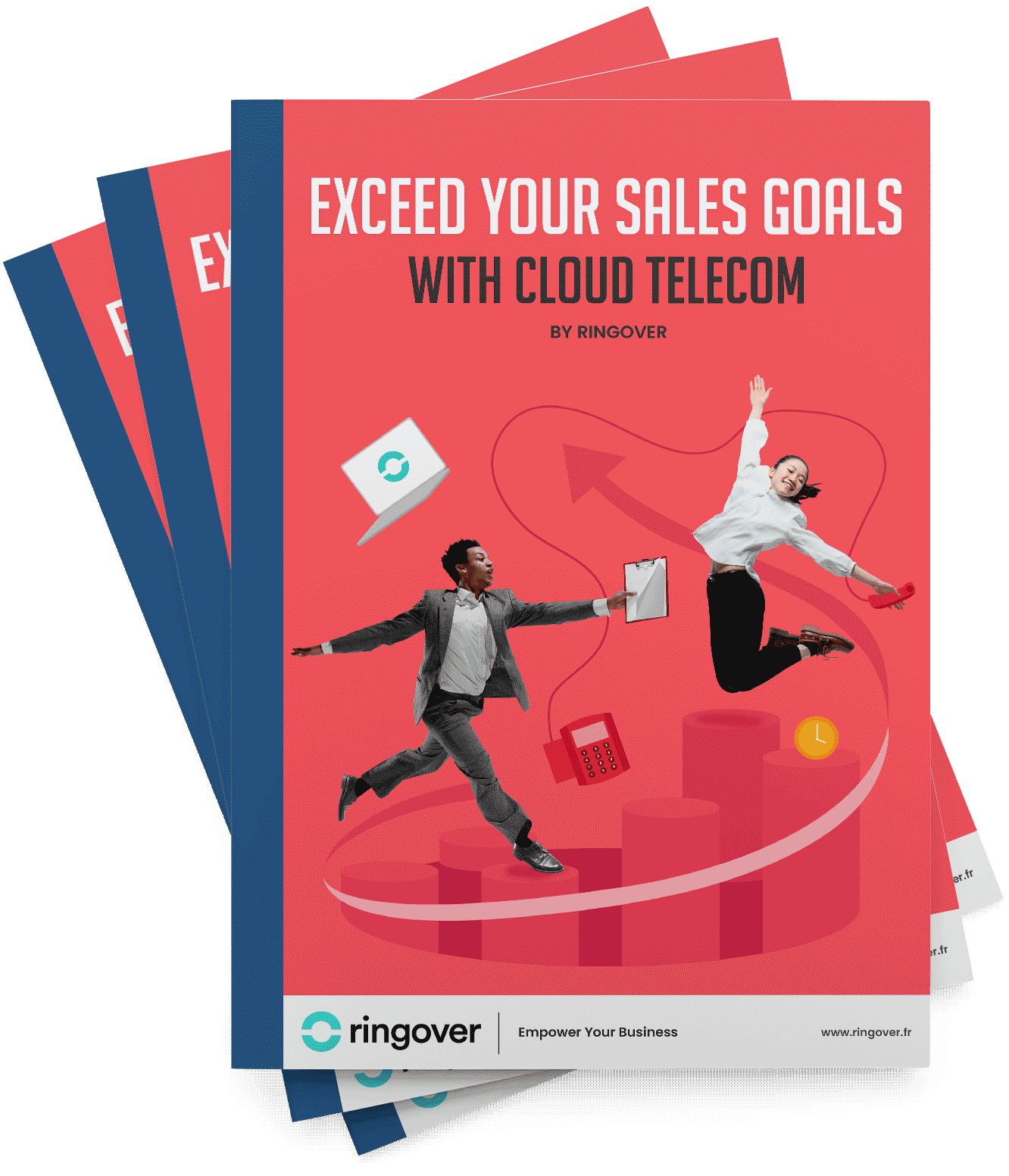Summary
Artificial intelligence has entered a new era with the rise of AI agents. Unlike traditional decision-support tools, these autonomous virtual assistants can perform complex tasks without constant human supervision.
The global AI agent market, valued at $5.40 billion in 2024, is projected to reach $7.63 billion in 2025 [1] and surpass $50 billion by 2030, growing at an average annual rate of 45.8% [2]. This surge clearly demonstrates how these technologies are transforming the way businesses engage with customers and organise their marketing operations.
What Is a Marketing AI Agent?
A marketing AI agent represents a new generation of intelligent systems–far more advanced than traditional AI tools. While most AI solutions simply analyse data or make recommendations, an AI agent goes a step further: it is a fully or semi-autonomous system capable of acting, interacting, and making marketing decisions without continuous oversight.
In other words, it doesn't just assist marketers–it becomes an active player in executing marketing strategy.
Decision-Making Autonomy That Changes Everything
One of the defining features of marketing AI agents is their ability to make decisions in near real-time.
Based on predefined objectives, they can:
- Adjust an advertising campaign,
- Modify targeting parameters, or
- Trigger actions on a specific marketing channel.
This trend is no longer science fiction. Gartner predicts that by 2028, nearly 15% of daily work decisions will be handled by AI agents, up from a marginal share today [3]. In practice, this means marketing teams will gradually shift toward strategic oversight, while execution becomes increasingly automated.
Continuous Learning as a Growth Engine
Unlike traditional algorithms that require frequent reprogramming or manual updates, a marketing AI agent is designed for continuous learning.
An AI assistant:
- Learns from ongoing campaigns,
- Adapts to customer feedback, and
- Refines its actions and recommendations accordingly.
This self-improving feedback loop makes the agent more effective over time. For example, an AI agent managing email marketing could:
- Optimise send sequences
- A/B test subject lines
- Personalise messages based on recipient behaviour
- Automatically refine performance metrics to maximise engagement
A marketing AI agent can coordinate several functions simultaneously, such as:
- Audience segmentation
- Customer journey personalisation
- Content generation
- Campaign planning and monitoring
- Performance analysis
The benefit is clear: instead of juggling multiple specialised tools, marketers gain access to a digital orchestrator that ensures consistency, cohesion, and efficiency across all actions.
This orchestration also helps eliminate marketing silos, which are often the main cause of inefficiencies and lost opportunities.
Marketing AI Agent: Key Features to Look For
It would be far too simplistic to choose a marketing AI agent based solely on its price or interface. What truly makes a difference is its built-in capabilities, which determine its real value to the business. Here are the essential features to examine closely.
Predictive Analytics and Conversational Intelligence
A high-performing marketing AI agent should include predictive analytics tools capable of identifying weak signals and anticipating customer behaviour.
For example, it might detect which subscribers are most likely to unsubscribe from a newsletter or pinpoint the ideal moment to launch a targeted promotion. This foresight enables smarter allocation of advertising budgets and helps maximise ROI [4].
In parallel, conversational AI allows the agent to communicate naturally with customers. It doesn't just respond–it understands context, detects intent, and can even adjust its tone to match the situation [5].
Omnichannel Automation
Modern, effective marketing campaigns now often rely on multichannel communications. A capable AI agent should be able to orchestrate actions across multiple platforms–email, SMS, social media, chatbot solutions, and even automated phone calls. This omnichannel communication orchestration ensures brand consistency while maximising the number of customer touchpoints and engagement opportunities.
Advanced Reporting and Continuous Optimisation
Beyond execution, a marketing AI agent must also excel in performance analysis.
Dynamic dashboards, detailed KPIs, and actionable recommendations help turn raw data into clear, strategic insights.
This dual benefit provides clear visibility for marketing teams and automatic strategy optimisation, allowing the agent to fine-tune campaigns for even better performance.
Practical Use Cases of Marketing AI Agents
Here are several examples of how AI agents are transforming marketing operations through innovation and enhanced efficiency.
1. Smart Content Generation and Optimisation
AI agents are reshaping the way businesses create and distribute content. Their strength lies in their ability to generate diverse, on-brand content quickly while adapting to audience expectations and preferences.
They can handle tasks such as:
- Writing SEO-friendly blog articles
- Creating social media posts optimised for each platform
- Producing marketing visuals or videos, and more
Some advanced agents go even further by crafting custom call scripts for sales teams—taking into account industry, prospect maturity level, and previous interactions.
This trend is already well-established: according to recent figures, 53% of marketers use AI video generation, and 52% rely on chatbots to streamline customer interactions.
These tools are no longer novelties–they've become everyday essentials for modern marketing teams [6].
2. Advertising Campaign Optimisation
Marketing AI agents also bring tremendous value to paid campaign management.
Their ability to process and analyse millions of signals in real time allows them to:
- Optimise media buying
- Automatically adjust bidding strategies
- Target the most responsive audiences
In practice, this results in lower unnecessary spending and higher conversion rates.
3. Personalised Customer Experiences
In a world where attention is increasingly scarce, AI agents make it possible to deliver hyper-personalised experiences. From AI chatbots that provide 24/7 customer support to tailored product recommendations in e-commerce, AI enhances engagement through smoother, more relevant interactions.
Example: A shopper browsing an online store could instantly receive a personalised offer based on their past preferences, significantly increasing the likelihood of a purchase.
Automated Lead Tracking and Nurturing
Finally, marketing AI agents excel at lead management. They ensure automated follow-up, segment leads based on their level of maturity, and trigger the right actions at the right time–whether that's sending a piece of content, offering a free trial, or scheduling a callback.
This smart automation of lead nurturing saves sales teams valuable time while preventing prospects from being lost in the sales tunnel.
Tips for Implementing a Marketing AI Agent
Below are a few practical recommendations to help you successfully deploy your marketing AI agent.
Adopt a Gradual and Measured Approach
Implementing a marketing AI agent should not be seen as a sudden shift but rather as a progressive evolution. Start with a limited scope–for example, automating email campaigns or advanced audience segmentation–to minimise risks and quickly measure tangible results.
The key is to move step by step:
- Evaluate the real impact on specific KPIs (conversion rate, cost per acquisition, campaign engagement).
- Adjust settings progressively based on field feedback to fine-tune the models.
- Support teams as they learn to use the tools, helping them see AI as an ally rather than a constraint.
- Reduce operational risks by maintaining a human safety net before transitioning to full autonomy.
Choose the Right Use Cases
The effectiveness of a marketing AI agent directly depends on the implementation scenario.
Focus on repetitive, time-consuming tasks that have a high impact on performance first.
Some relevant examples include:
- Real-time optimisation of advertising campaigns
- Dynamic personalisation of web content
- Automated lead tracking in the CRM
This pragmatic targeting allows for smooth adoption and generates quick wins–crucial for convincing both teams and leadership.
Centralise and Unify Data
While the benefits of marketing AI agents are clear, their deployment remains an organisational challenge. A study shows that 54% of marketers feel overwhelmed by integrating AI into their processes, while 37% have not yet adopted AI tools due to uncertainty about how to use them effectively [6].
The main bottleneck isn't technology–it's data management. Without centralisation, the AI agent operates in silos, limiting its ability to generate meaningful insights or automate truly personalised customer journeys.
Centralisation depends on several well-established practices:
- Integrating CRM systems with marketing tools to ensure sales and customer data feed campaigns directly.
- Synchronising call and interaction data through cloud telephony solutions like Ringover to provide a unified view of communications.
- Connecting analytics tools to advertising platforms to optimise call campaigns based on real-time behavioural data.
- Unifying the customer history across all touchpoints (website, email, social media, phone, chatbot solutions) to ensure consistency in every interaction.
Train and Support Teams
A striking 89% of marketers plan to adopt natively AI-powered solutions as soon as they become available [6]. However, experience shows that success depends not only on technology–the human factor remains essential.
Training is a central pillar of this transition and should cover several areas:
- Understanding AI's capabilities and limits: know what an agent can achieve, and when human intervention is still necessary.
- Setting clear strategic objectives: every AI agent must have a defined mission (e.g., email automation, lead scoring, conversational follow-up).
- Ongoing supervision and fine-tuning: AI learns, but it can also inherit biases or drift from initial goals; regular human oversight ensures alignment.
- Quality validation: all AI-generated content or recommendations should be reviewed, tested, and refined to maintain brand consistency and relevance.
In short, AI is a powerful efficiency driver, but it's human expertise that turns it into a true performance asset.
Define Measurable and Evolving Objectives
A marketing AI agent only delivers value when it operates under clear, trackable performance indicators.
These KPIs should align with the agent's specific role:
- Conversion rate for a lead-scoring agent
- Open and click rates for an email marketing agent
- Average response time for a conversational agent (chatbot or voicebot)
- Overall ROI for multi-channel automated campaigns
The key is to design flexible objectives that can adapt to market shifts and customer behaviour.
AI agents are not static–they learn and improve continuously.
Key Points to Monitor for Your AI Agents
Constant vigilance is required to maintain the quality of automated actions and ensure regulatory compliance.
Here are some important aspects to monitor when deploying marketing AI agents.
1. Ongoing Quality and Consistency Monitoring
Even though a marketing AI agent can autonomously generate and optimise content, human oversight remains crucial.
AI can produce quickly, but without guardrails, there's a risk of drift or disconnect from the brand's identity.
This supervision should include:
- Regular audits of generated content to verify its relevance and tone,
- Strategic alignment checks to ensure all outputs support broader brand goals,
- Validation of AI-driven recommendations–since purely algorithmic optimisations may favour short-term gains over long-term vision,
- Continuous parameter adjustments to fully leverage AI's adaptive learning capabilities.
2. Regulatory Compliance and Data Protection
Data management is another major issue. Marketing AI agents rely on analysing large volumes of personal data–purchase histories, interactions, and behavioural insights.
Companies must therefore ensure that they:
- Strictly comply with GDPR and all applicable regulations
- Secure sensitive data with encryption protocols and restricted access
- Clearly inform customers about how AI is used in their interactions
- Maintain transparency regarding the automated mechanisms that influence outcomes (personalisation, recommendations, scoring)
Compliance isn't just a legal requirement–it's a trust-building factor. In an era where users are increasingly attentive to data privacy, this vigilance becomes a competitive advantage.
Maintain Balance Between Automation and Human Control
A marketing AI agent shouldn't take over everything. Certain aspects still require human input–strategic decisions that demand a holistic view, crisis management where diplomacy matters, or sensitive customer relationships requiring empathy and discernment.
Similarly, creative innovation remains a field where human spontaneity has a decisive edge. In essence, AI should be viewed as a performance enhancer, never as a replacement for the human element that defines meaningful customer relationships.
Technological Evolution and Adaptation
According to Deloitte, 25% of companies using generative AI will be operating agent-based AI systems by 2025, a figure expected to rise to 50% by 2027 [7].
This projection highlights a key insight: adopting marketing AI agents is a dynamic, ongoing process. Organisations must remain agile–progressively integrating new features and continuously experimenting to capture innovation while controlling risks.
A New Marketing Era with AI Marketing Agents
The rise of marketing AI agents marks a pivotal milestone in digital transformation. Far more than simple tools, they are operational partners capable of orchestrating campaigns, interactions, and analytics with unmatched precision. Their gradual adoption is already reshaping marketing practices, putting agility and personalisation at the heart of every strategy.
However, this technological power must be balanced with strong governance–including human supervision, data compliance, and thoughtful integration.
By combining artificial intelligence with human expertise, businesses gain a decisive competitive edge–both in customer relations and in overall marketing performance.
👉 Ready to take the next step?
Discover how Ringover puts AI at the service of both performance and customer experience.
Citations
- [1]https://www.demandsage.com/ai-agents-statistics
- [2]https://www.grandviewresearch.com/industry-analysis/ai-agents-market-report
- [3]https://www.gartner.com/en/articles/intelligent-agent-in-ai
- [4]https://spotintelligence.com/2025/01/09/churn-prediction/
- [5]https://www.ultraai.com/blog/conversational-ai-for-ecommerce
- [6]https://www.hubspot.com/state-of-marketing
- [7]https://www.deloitte.com/us/en/insights/industry/technology/technology-media-and-telecom-predictions/2025/autonomous-generative-ai-agents-still-under-development.html
Published on November 13, 2025.



